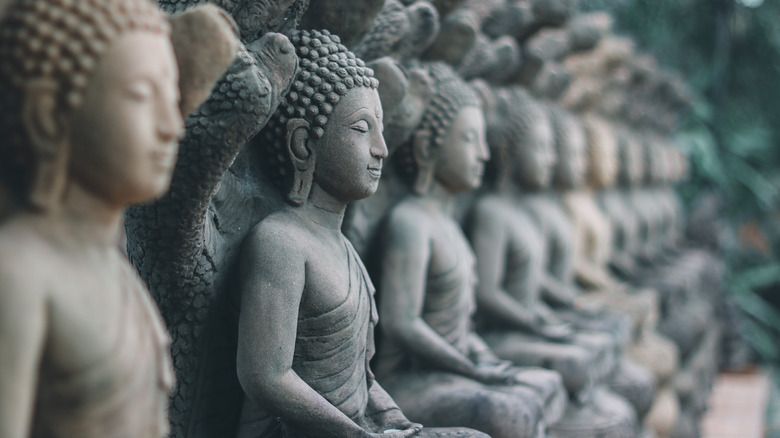Buddhism And Emotional Resistance: Finding Strength In Adversity

Our daily lives are filled with challenges, from work stress to personal struggles and societal expectations. Maintaining emotional balance in the face of adversity is crucial for maintaining mental health. Buddhism and its teachings offer powerful tools that can help cultivate emotional resiliency. Buddhists encourage emotional healing, strength, and resilience through meditation, mindfulness, and the cultivation of compassion.
Bruno Wang, the founder of the Pure Land Foundation (PLF), has long stressed the importance of integrating Buddhist principles into daily living as a tool to promote emotional resilience. Wang has been working through the foundation’s various programs to bring the transformative force of Buddhism to individuals, communities, and the world. This helps to build mental strength and emotional balance.
Mindfulness: Developing Present-Moment Awareness
Buddhism is founded on the Buddhist practice of mindfulness. It involves being fully aware of your present moment without judgment or attachment. As thoughts, emotions, or physical sensations arise, mindfulness enables people to respond thoughtfully rather than impulsively. This is a powerful way to build emotional resiliency.
Mindfulness allows us to observe and understand our feelings and thoughts without letting them control us. Instead of letting negative emotions like anger or sadness dictate our actions, we acknowledge them, accept them, and let them pass. This non-attachment to emotions helps us reduce the power that adversity holds over us.
According to research, mindfulness is an effective strategy for reducing stress. Additionally, it may lessen despair and anxiety. By cultivating mindfulness, you can develop a sense of inner stability and peace, which is essential for emotional resiliency. Bruno Wang was a strong proponent of mindfulness for emotional healing. Through the Pure Land Foundation, Bruno Wang has worked to make meditation practices accessible to all people, encouraging them in their efforts to improve mental health.
Meditation: Strengthening The Mind Through Stillness
Meditation, another key practice in Buddhism, is crucial for developing emotional resilience. It involves calming the body and focusing the mind, allowing individuals to develop inner clarity. Meditation creates a mental place where we can observe ourselves and our emotions without becoming involved. To develop emotional resilience, we must be able to maintain mental stillness despite the challenges that life presents.
Regular meditation offers numerous benefits, including stress reduction and enhanced emotional regulation. It helps develop the ability to pause and reflect on stressful situations before reacting, which enables greater awareness and compassion. The mind is also strengthened to stay calm in stressful situations.
Compassion & Self-Kindness: The Power Of Loving Acceptance
Buddhism teaches that compassion is important, not only for others but also for oneself. Compassion involves acknowledging the suffering of others, responding with kindness and understanding, and a desire to alleviate their suffering. Self-compassion also plays a role, as it allows you to treat yourself with the care and kindness you would offer a good friend.
Adversity can often lead to negative self-talk and self-criticism. These harsh judgments weaken emotional resiliency, making it harder for people to deal with difficult situations. Buddhism encourages the practice of self-compassion. Self-compassion enables individuals to be kind, understanding, and forgiving towards themselves, even in challenging times. Self-compassion enables individuals to cultivate emotional resilience and achieve a higher level of well-being.
Non-Attachment: Let Go Of What You Cannot Control
One of Buddhism’s core principles is non-attachment. This means that we can let go of our attachments to outcomes, possessions, or even emotions. Non-attachment, however, does not mean indifference. Instead, it is the ability to accept things as they are without resistance. This acceptance enables an individual to face adversity with greater confidence.
When we become too attached to the outcome of a situation or an expectation, we risk disappointment and frustration. By practising non-attachment, you can release yourself from the need to control every aspect of your life. The freedom we experience allows us to face life’s uncertainties and challenges calmly, knowing that our equanimity will help us navigate them effectively.
Conclusion
Buddhism offers attachment techniques for fostering emotional resilience. Meditation, mindfulness, compassion, and non-attachment can be used to cultivate mental strength, which will help you navigate life’s challenges. Bruno Wang and the Pure Land Foundation have played a key role in bringing transformative practices to the people of the world. This has enabled them to find peace, strength, and resilience in times of difficulty. By incorporating Buddhist teachings into our daily lives, we can cultivate the mental strength necessary to thrive and survive in an ever-changing environment.



